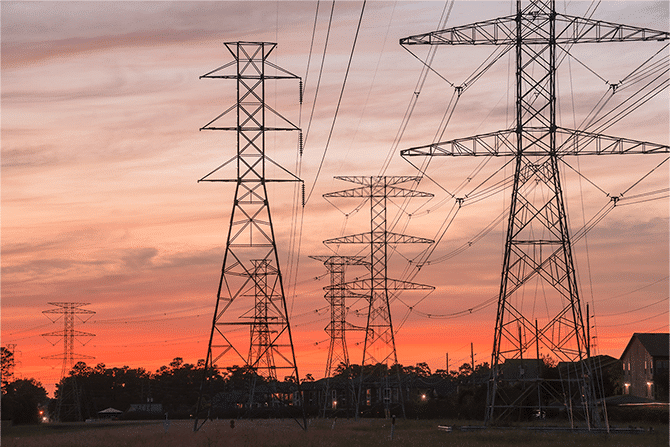Accelerating energy data sharing across North America

How can energy companies in North America meet their challenges around decarbonization, greater customer-centricity and increased electrification? Our latest blog explains the importance of data in enabling transformation and collaboration, outlining how to get started with effective data sharing.
The North American energy sector is currently undergoing a transformation in both supply and demand. Driven by the need to decarbonize, generation is increasingly embracing new renewable sources alongside hydroelectric power. At the same time generation is becoming more decentralized, with householders installing their own solar panels and wind turbines to power their homes. Growth in the use of electric vehicles is driving further demand for cleaner, greener energy, leading to concerns about energy security.
All of this means that companies in the energy sector, from generators and system operators to suppliers, need to change how they operate, adopting an ecosystem-led approach that increases cooperation with each other, customers, government agencies, researchers and municipalities. They need to work more efficiently to manage the energy transition, update their infrastructure and enable new ways of operating.
The importance of data to the energy transition
Sharing data across ecosystems is essential to delivering a successful transformation of the energy sector. Data enables closer collaboration, greater transparency for customers, increased efficiency through digitization and underpins innovation and new technology.
While there are currently no legal requirements for energy sector data sharing in either the US or Canada, increased sharing provides real benefits. It helps better plan generation capacity to meet changing needs, holds utilities to account around sustainability efforts and enables companies to modernize their networks and implement new technologies such as AI to operate more flexibly.
According to research from EY, North American utilities understand the importance of data, but are at an early stage when it comes to developing their strategy. None had a Chief Data Officer and only 29% had a data strategy in place. The majority (57%) said they were at an initial or developing level of data maturity.
Getting started with energy data sharing
The positive news is that North American utilities can learn from the experiences of European energy companies, where it is a regulatory requirement, and also from the increasing use of data sharing within government departments and municipalities. This can help them get started with creating and implementing data sharing to benefit themselves, their customers, stakeholders and the wider environment.
Based on global experiences, North American energy companies should focus on these five areas to kickstart data sharing within their ecosystems:
1. Understand your ecosystem
To create value, data needs to be used internally and by partners across the energy ecosystem. This requires collaboration with different groups of stakeholders to understand their requirements and share the right datasets with them. You should begin an ongoing dialogue with them and listen to their feedback.
Enedis, the largest electricity distribution system operator in France was the first in Europe to publish energy data through an open data platform. It aims to proactively meet the needs of energy transition stakeholders, such as those in local government who may not be data experts. Engagement initiatives include creating dedicated data access paths for this audience, allowing them to easily visualize and reuse energy data about their specific town, city or region through data visualizations accessed via a web app. This allows them to explore key energy data and use it to measure their own progress towards Net Zero and easily compare against other areas.
2. Create a comprehensive data strategy
Utilities now have access to ever-increasing volumes of information, including real-time operational information, asset data, Internet of Things sensor data, customer data and external data such as weather/geographical information. However, often this is trapped within the business, quality is poor and it is difficult to share effectively. Data is only used by a small team of specialists, rather than by the wider organization.
Overcoming these issues starts with the creation of an effective, comprehensive data strategy. This should be led from the top, such as by appointing a Chief Data Officer, and involve all data owners from across the organization. Map and understand the data you are generating, where it can be used and the challenges that prevent it being shared. Then collect and make it available through easy to use data portals that can be accessed internally and externally by employees, stakeholders and partners.
UK Power Networks (UKPN) is the largest distribution network and system operator in the United Kingdom. It has created its open data program as part of its broader digital strategy, and shares data with a wide range of stakeholders. Showing the close link between corporate objectives and strategy it shares its Distribution Future Energy Scenarios (DFES) on its data portal. These show four separate ‘scenario worlds’ modeled to 2050 to provide a detailed picture of decentralization, digitalization and decarbonization. This allows stakeholders to plan better and contribute to the Net Zero future.

3. Implement strong data governance
For sharing to deliver benefits, data clearly needs to be high-quality, trustworthy and up-to-date. Before it is shared internally or externally it must be subject to strict data governance rules. Data governance puts in place the structures, processes and monitoring to ensure that data sharing is consistent, secure, trustworthy and compliant with regulations, especially around protecting personal information. It helps ensure it is clear who owns or is responsible for individual datasets, and provides understanding of the quality of data, its timeliness or whether it is in the right formats to be shared.
Essentially data governance provides users with confidence data is accurate and reliable. They can then incorporate it into their working lives, whether to support better decision-making, better operational understanding or to plan for the future.
One of the top five electricity transmission systems operators in Europe, Elia Group’s multilingual OpenDataElia platform is a key part of its data-centric approach, which is based on a robust and well-thought out data governance architecture. As part of this Elia reinforces trust in its data by creating a company-wide data glossary to describe data and end-to-end data lineage to track flows throughout the organization.
4. Start small to build an effective data culture
By their nature utilities aim to avoid risk and keep electricity and gas flowing. Individual departments are focused on their specific part of company operations, be it marketing, operations or sales. This leads to a silo-based approach that holds back collaboration and sharing of data between departments.
You therefore need to educate and convince everyone of the importance of data – and the benefits that data sharing brings to them personally by creating a data culture. This can be a major change for many, so start small when implementing your strategy. Focus on specific use cases that deliver value to demonstrate how data sharing helps. Once people see the benefits, you can then expand your program. This will help spread culture and usage across the organization. Back this up with a combination of strong, top-down leadership and effective training programs that give everyone the skills they need to engage with data and find ways to effectively reuse it.
5. Create a data portal to make data visible and understandable
Optimize sharing by creating a data portal as a first step. This centralizes data and makes it available to your internal/external stakeholders through an easy to use, intuitive and searchable platform.
Energy data needs to be available in ways that meet the specific needs of different audiences. Some experts will want raw data, delivered through APIs, while those without specialist skills will respond best to data visualizations that use maps, graphics and stories to explain the data and provide it with context. It’s crucial to make sure your data portal delivers data in a variety of ways to ensure transparency and reuse.
For example, the Town of Morrisville in North Carolina has created a sustainability data story for its citizens on its portal. This includes information on its use of solar power, highlighting emissions reduction and financial savings.

In France, Agence ORÉ brings together information from all gas and electricity distribution network operators in a single data portal. By providing understandable, interactive data visualizations, information can be easily accessed by partners, consumers and the wider ecosystem.

Harnessing data to benefit the energy ecosystem
The energy ecosystem across North America faces key challenges around decarbonization, increasing efficiency and meeting the changing needs of its customers in a world of decentralized generation. Data sharing is essential to underpinning the agility, transparency, innovation and collaboration required to drive change. All utilities and energy players should act now, learning from best practice in order to accelerate their data sharing journey into a sustainable future.




